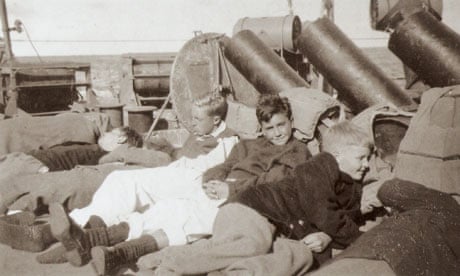There will be a poignant wartime anniversary tomorrow, but amid all the services commemorating the Battle of Britain and the Blitz this one has crept under the radar. On 17 September 1940, a passenger ship called the City of Benares was sunk by a German U-boat while crossing the Atlantic. It was carrying 406 passengers and crew, of whom 100 were children being evacuated to Canada and the US, most of them as part of a government scheme organised by the Children's Overseas Reception Board (Corb). Only 19 of the children survived. When the U-boat crew got back to their base in France and discovered that the Benares's cargo had been children, they wept.
Just nine of those child survivors are now alive, and sadly they have no plans to mark the 70th anniversary of the sinking. "We're all getting too old," says Fred Steels, who was 11 when the Benares sank. "But at 9.45 [in the evening] on Friday, which is the time the ship was torpedoed, I'll be thinking about it – the water rushing in and a bunk coming down on top of me. When I got out of the cabin there was a huge hole in the deck, and a dirty great seaman grabbed me and another boy and threw us into a lifeboat." They were among the fortunate few: the fact that the children were already in bed below deck and that most were travelling without their parents meant that a far higher proportion of children than adults were lost.
Derek Bech, then aged nine, was on board with his mother and two sisters – they were travelling as private passengers, not as part of the Corb scheme. One sister made it into a lifeboat; Bech, his other sister and their mother survived by clinging to a tiny raft in rough seas. "Some of the children were killed in the explosion," he recalls, "some were trapped in their cabins, and the rest died when the lifeboats were launched incorrectly and children were just tipped into the sea. All I can remember were the screams and cries for help. It was one of the worst disasters at sea concerning children, and it should always be remembered."
Most of the survivors were picked up the following afternoon by HMS Hurricane, which had steamed 300 miles in answer to the Benares's Mayday call, but one lifeboat – containing Steels, five other boys and 40 adults – had drifted off, and was picked up by HMS Anthony eight days later. "We went through three storms, great Atlantic gales, before we were picked up," says Steels. "We were frightened, but we tried not to show it. Every anniversary you stop and think about it – all the kids we knew. Two of the lads on the lifeboat with us lost their five-year-old brothers."
HMS Hurricane was captained by Lt Commander Hugh Crofton Simms, and his son Blake Simms says the experience affected him deeply. "He realised [once he'd decoded the Mayday call] that there were women and children on board, and went as fast as he could. He reached the estimated position at 2.30 in the afternoon, in a force eight gale and in mountainous seas, and saw the scattered remains of all these lifeboats, nearly every one of which had dead children in them. He dedicated the rest of his life to the destruction of the Hun."
One family had lost five children; others two or three. Unspeakable tragedies which, amid so much wartime suffering, went unspoken. In the wake of the sinking, the Corb evacuation plan was abandoned. Death at home among loved ones was deemed preferable to a lonely death at sea.
